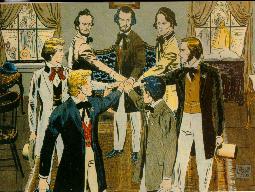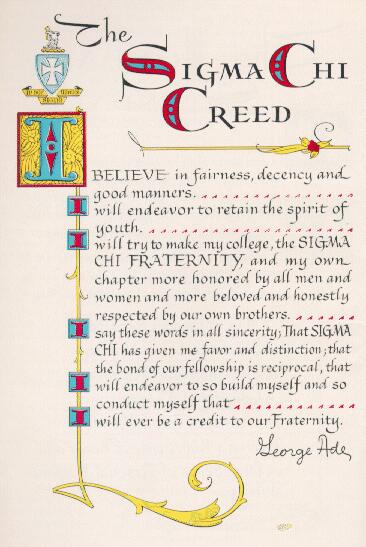          |
The Beta
Theta Chapter of Sigma Chi
The Beta Theta Chapter received its
charter November 16, 1909. Every year after, we are
awarded prizes for our excellence. Over 3 of the last 5
years, including last year, we won the Cathedral Award,
given to the best overall fraternity at the University
of Pittsburgh. Our chapter has received the Peterson
Significant Chapter Award, the highest honor bestowed
upon a Sigma Chi chapter, 4 times in our history. The
City of Pittsburgh even declared October 1, 2000 Sigma
Chi Day.
The
Founding of Sigma Chi
 Sigma
Chi was founded on June 28, 1855, by seven undergraduate
men at Miami University. They felt that the principles
of "fraternity" were crucial to the overall college
experience, but were dissatisfied with the unbalance of
loyalties and ideals within the fraternities which
existed at their university. Six of the Sigma Chi
founders were members of the 12-man Delta Kappa Epsilon
fraternity at Miami University; when a controversy arose
involving a member of the fraternity which could not be
resolved, the membership was divided equally. The
actions from this controversy led to the founding of
Sigma Chi. Sigma
Chi was founded on June 28, 1855, by seven undergraduate
men at Miami University. They felt that the principles
of "fraternity" were crucial to the overall college
experience, but were dissatisfied with the unbalance of
loyalties and ideals within the fraternities which
existed at their university. Six of the Sigma Chi
founders were members of the 12-man Delta Kappa Epsilon
fraternity at Miami University; when a controversy arose
involving a member of the fraternity which could not be
resolved, the membership was divided equally. The
actions from this controversy led to the founding of
Sigma Chi.
The Controversy
In the mid-19th century, an important
aspect of college life was participation in student
scholastic and debating societies. One of the most
prominent at Miami was the Erodelphian Literary Society.
When time came to elect Poet (President) for this
prestigious society, a dispute arose in Delta Kappa
Epsilon Fraternity (Dekes) over who should hold this
position. Several members of this society were also
members of the Dekes and one of its members had been
nominated for Poet. However, four of the 12-man Deke
fraternity would not support the nomination of a fellow
member because they knew he had no poetic abilities.
These four supported another man who was not a Deke.
James Caldwell, Isaac Jordan, Benjamin Runkle, and
Franklin Scobey refused to vote for their fraternity
brother simply because he was a brother; Thomas Bell and
Daniel Cooper agreed with these four and thus split the
fraternity in half on the issue.
The Break
Neither side would "give in," resulting
in pressure from alumni. These "recalcitrant six," as
they were called, would not be maneuvered by alumni;
thus, the alumni judged the six guilty of violating
"brotherly unity," and the decision was made to expel
two of the rebels. The alumni were amazed that the six
stuck together. When confronted by an alumnus, Runkle,
speaking for the other five, stepped forward, removed
his Deke pin, threw it on the table, and shouted, "I
didn't join this fraternity to be anyone's tool. And
that, sir, is my answer." The six abruptly left and were
later expelled from the fraternity. But they were
already making plans to create a fraternity of their
own, based on noble principles and ideals.
The Founding of Sigma Chi
These six men wisely associated
themselves with William Lockwood, a highly intelligent
student with valuable business sense; he became the
individual who set up the plan for the new fraternity.
They formulated the first constitution and initiation.
Because they believed that the existing fraternities did
not emulate the true feeling of "fraternity" and that
the other fraternities' ideals apparently meant little,
they established a new fraternity, whose ideals and
foundations were symbolized by the badge they
designed---the distinctive White Cross. Sigma Chi's
ideals of friendship, justice, and learning would be
loftier and would evoke standards by which a man could
improve his life while working closely with others from
different backgrounds, with divergent ambitions and
diverse abilities. The founders themselves, it is felt,
personified these ideals. Sigma Chi was officially
founded on June 28, 1855.
Sigma Chi's Purpose
The fundamental purpose of the Sigma Chi
Fraternity is to cultivate an appreciation of and
commitment to the ideals of friendship, justice and
learning. These ideals and objectives have been at the
heart of Sigma Chi since its founding by seven men at
Miami University in Oxford, Ohio, on June 28,1855.
Our brotherhood has its roots in the
collegiate experience and creates a lifelong commitment
to strive for true friendship, equal justice for all,
fulfillment of learning as a part of our overall
responsibilities to the broader communities in which we
live. We achieve these ideals through the practice of
qualities embodied in our Ritual. We continuously
reaffirm our purpose through the observance of Sigma
Chi's governing laws.
Each Sigma Chi completes a period of
education devoted to the understanding of our unique
history, traditions, and practices, which culminates in
an opportunity to accept a lifelong commitment to Sigma
Chi and the achievement of our purpose.
Sigma Chi Fraternity best serves its
purpose by developing, implementing, and monitoring
programs that foster leadership, build character and
promote positive relationship skills. This enables our
members to become productive and caring participants in
their families, colleges, and communities.
Sigma Chi Fraternity programs:
-
Encourage positive and responsible
interaction with others.
-
Acknowledge and support a value
system consistent with the Ritual.
-
Enhance individual academic skills
and scholastic achievement.
-
Develop leadership skills and
personal responsibility.
-
Promote and reinforce acceptable
social behavior.
-
Cultivate personal growth and
fulfillment.
-
Serve others by actively involving
ourselves in the welfare of the larger community.
Sigma Chi's Writings
The following writings are the
always-alive foundation of our fraternity; they are a
clear introduction to what we strive for, and they are
the guidelines to which we return year after year,
reminding ourselves of the promises we have given.
Though some members misinterpret the
Jordan Standard as a lofty set of goals for which to
strive, its real purpose is a minimum requirement of
those students we recruit.

 |